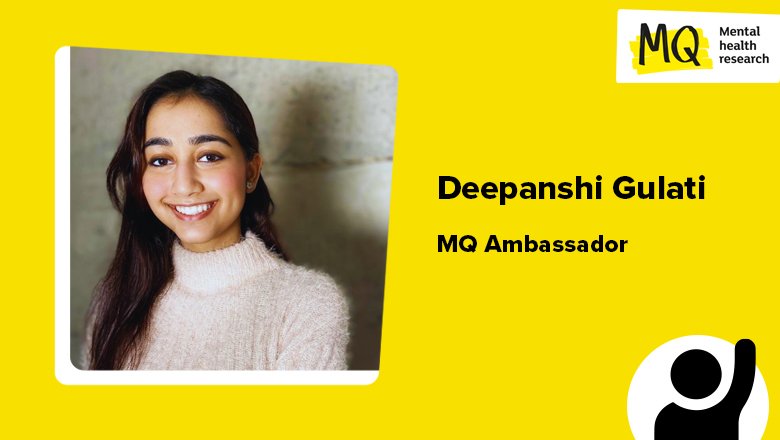MQ Ambassador profiles: meet Deepanshi Gulati

In a series of profiles, we at MQ Mental Health Research would like to introduce to you some of our wonderful MQ Ambassadors. These are the individuals who support our charity organisation and lend their voices of lived experience expertise of mental illness to research and more.
MQ Champion Deepanshi Gulati, who is also the founder of mental health non-profit Rain On Me and a trainee psychotherapist, chatted to us to share her experience of mental health conditions and why she became interested in MQ Mental Health Research.
Deepanshi, thank you so much for chatting with us. Firstly, what is Rain On Me and what other roles do you have regarding mental health?
Rain On Me offers international and local peer support to young individuals seeking a space to belong, vent distress, and feel empowered to take charge of their lives.
I’m also on the Youth Board at Calzy Foundation, and a Trustee of the charity LAPIS (London Accessibility Psychotherapy & Inclusive Supervision). I also work with the Royal College of Psychiatrists as a Peer Reviewer.
What are your interested outside of work that help you manage your own mental health? What’s your favourite thing about being alive?
When not working/studying, I love to cook, travel and take Japanese language classes. I’m into Anime, Disney movies and documentaries. My favourite thing about being human is having the opportunity and capability to experience and overcome a beautiful array of complex emotions life offers.
What mental health conditions have you been diagnosed with?
I’ve lived with ADHD, PTSD, OCD, GAD and depressive tendencies for over 15 years and have learned to make my vulnerabilities my strength.
When did you first experience symptoms of mental health distress? What were those symptoms?
I think I didn’t realise what was happening until only a few years ago when I reached my rock bottom, I guess you can say. I was too scared to close my eyes to sleep at night because the whispers in my head kept telling me that something was going to attack me in my sleep. I would turn in my bed constantly, ensuring no one was behind me.
It was terrifying, like being in a horror movie every night. I knew the voices in my head were not real, but they were so persistent that I gave in to everything they said. I started skipping trains or missing special occasions because of my intrusive thoughts. I got regular anxiety attacks and lived in fear and paranoia.
Who has helped you the most with your mental health experience?
My family, support group and my dog have offered me unconditional support.
When your condition was or is difficult, what are the best things someone who cares about you can do to help you?
Just listen, be there, ask me what I need and not assume, and try not to give me unsolicited advice even though I understand it usually comes from good intentions.
Are there upsides to mental illness, or any silver linings?
I’ve become drastically self-aware since my diagnosis. Reaching rock bottom forced me to introspect and see what I needed to change to overcome my hardships. I’m more aware of when I need self-compassion and when I need self-discipline. I also have deeper connections with others as my experiences allow me to empathise with their struggles and be a better listener.
Although it can be overwhelming sometimes, I personally don’t see my mental illnesses as ‘illnesses’. I see it as my barrier to accept, understand and overcome, as others similarly have their own barriers. My lived experience allows me to see life from a different perspective and, in many cases, find innovative solutions to problems.
What helped you in recent years with your mental health? What did not help you?
I used the opportunity of the lockdown to learn new things and spend quality time with my family. I appreciated the time I had to slow down, be present, and reflect on my life and where I was going.
What didn’t help was the constant news updates and witnessing so much pain and tragedy. I chose to filter what I was exposing myself to as it was causing me too much anxiety.
I also have Long Covid, so it does sadden me sometimes that it’s still lingering in me, and I haven’t been able to move on as much as some other people.
What are you looking forward to in your future?
I’m looking forward to meeting the person I am becoming. I also hope to see a kinder, more empathic world.
How did you get involved with MQ and why?
I started Rain On Me because I wanted to meet other people going through similar life experiences who could reassure me that I wasn’t alone in my struggles.
For me, the signs have been there for many years, but I didn’t know they were signs I was supposed to look out for. If I had received mental health education from a younger age or if it wasn’t a taboo topic to talk about, I think I would’ve been able to ask for help and tackle my struggles a lot sooner.
I wanted to do my part and help minimise stigma by normalising mental health struggles and empowering individuals to do good for themselves and others.
My goals aligned well with what MQ was already achieving through research and raising awareness. I genuinely believe MQ’s work will continue to save numerous individuals from further suffering and living in the dark.
Our thanks to Deepanshi for sharing her story, highlighting just why research matters for mental health and why the work MQ Mental Health Research does must continue.
Source link
#Ambassador #profiles #meet #Deepanshi #Gulati

